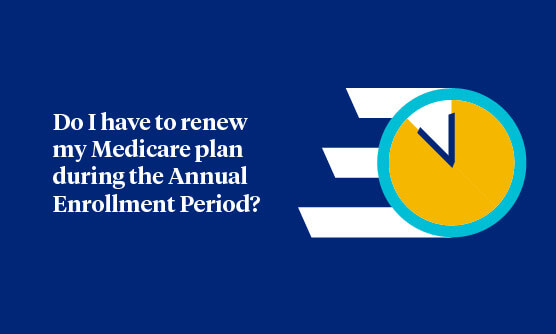
Well it depends. Do you feel that your plan fits your health needs still? Do you want to shop around and see if another plan may provide more benefits?
The simple answer here is that you have two options during the Medicare Annual Enrollment Period (formerly known as the Medicare Open Enrollment Period). (1) You can keep your existing Medicare plan. Or (2), you can change to a new Medicare plan(s).
Let’s look at both options real quick and highlight what you need to do.
I want to keep my current Medicare coverage
If you look at your Annual Notice of Change letter, don’t find anything amiss, and decide after carefully evaluating your Medicare plan that you want to keep it, we have good news.
Unless you take action to change it during the Annual Enrollment Period, your current Medicare coverage will renew for the following year. Automatic renewal helps ensure that you will have continuing coverage. It works the same whether you have Original Medicare (Parts A and B), a Medicare Advantage plan (Part C) or a Medicare prescription drug plan (Part D). You simply do nothing and your current coverage choices stay in place for another year.
I want to change my Medicare coverage
There are a lot of reasons to think about getting a new Medicare plan. Your health care needs may have changed in the last year. Maybe you want new benefits such as a fitness membership that your current plan doesn’t provide. Or maybe, you just want to explore your options and see if you can save on Medicare costs.
If you decide you want to change plans, there are three options to do so: (1) work with the insurance provider directly, (2) work with an insurance agent, or (3) contact Medicare. You can read more about each option here.
Answer these questions before exploring new Medicare plan options
So if you decide you want to change your Medicare coverage, it’s important to first clearly identify what you’re looking for in a new plan. And you won’t know unless you ask some questions.
Ask: Have my health care needs changed?
Things change in life, and some changes may affect the kind or amount of health care you need. For example:
- A new diagnosis might mean more doctor visits or new medications
- An advancing illness may increase the number or length of hospital stays or require home care
- Additional medications may be needed to manage chronic conditions such as diabetes, arthritis or heart disease
- Maybe you have a planned surgery coming up.
Examples like these can help get you thinking, but what’s important is to look carefully at your health care needs – past, present and, as much as possible, future. Only then can you choose the type of coverage and specific plans that may best meet your personal needs.
Once you have a good handle on your health care needs, it’s time to look at your current coverage.
Ask: What benefits did my plan not have that I want to have?
Medicare Part D and Medicare Advantage plans may change costs and coverage from year to year. You may have lost benefits you loved and that’s why you’re shopping around. Or, you may have never had them in the past and you want them now. In either case, make a list of the health benefits you want such as dental, vision or hearing coverage. Once you have your list, now you know what kind of plan you should look at and what benefits it must have.
Ask: How much money can I afford to spend on health care?
It may seem like a scary question to answer but it’s an important one. Take some time to look at how much you spent overall on health care costs in the last year. Then, you can look at different plans and how their cost sharing works for each. Compare plan costs by taking a look at your current health needs and try to estimate how much you may spend in the year to come. This will help you get an idea of the financial responsibility each plan may come with and if it will fit your lifestyle and budget.
Remember, you have a set time to decide
The Medicare Annual Enrollment Period runs October 15 through December 7. This is the only time each year anyone with Medicare coverage can make changes (outside of some special periods just for Medicare Advantage and Part D beneficiaries).
Automatic renewal is a great way to go if you feel confident that the coverage you already have will fit your needs going forward. It’s easy and convenient – but once open enrollment is over on December 7, your chance to change your Medicare coverage for next year is over, too, unless you move or otherwise qualify for a special exception. You get to choose the Medicare coverage that you think best fits your needs each year during this time. You may choose to let your current coverage renew. Or you may choose something different. The important thing is to choose.
About Medicare Made Clear
Medicare Made Clear brought to you by UnitedHealthcare provides Medicare education so you can make informed decisions about your health and Medicare coverage.
Get the latest
Boost your Medicare know-how with the reliable, up-to-date news and information delivered to your inbox every month.
*All fields required

